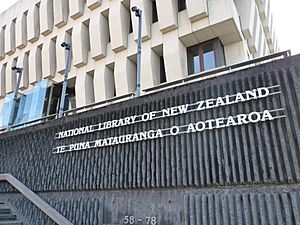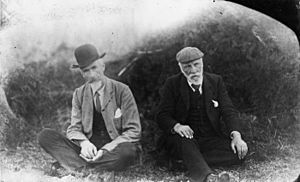Aotearoa facts for kids
Aotearoa (pronounced ah-oh-TEH-ah-ROH-ah) is the Māori name for New Zealand. Long ago, Māori people first used this name to talk about only the North Island. The whole country was sometimes called Aotearoa me Te Waipounamu, which means the North Island and the South Island. Before Europeans arrived, Māori did not have one single name for both islands together.
The most popular meaning for Aotearoa is "land of the long white cloud". This name comes from the cloud formations that helped early Polynesian sailors find the country.
Since the late 1900s, the name Aotearoa has become very common. You can see it used with English names for many national groups and places. For example, when people sing New Zealand's national anthem, "God Defend New Zealand", they often sing it in both Māori and English. This has helped more people learn the name Aotearoa.
Contents
What Does Aotearoa Mean?
The exact first meaning of Aotearoa is not fully known. But we can break the word into parts:
- ao can mean 'cloud', 'dawn', 'daytime', or 'world'.
- tea means 'white', 'clear', or 'bright'.
- roa means 'long'.
So, the most common translation is 'long white cloud'. This is often made longer to 'the land of the long white cloud'.
Another way to break down the word is Aotea (the name of a famous canoe that traveled to New Zealand) and roa ('long').
Some other ideas for the meaning include 'long bright world' or 'land of abiding day'. This might be because New Zealand has longer summer days compared to islands further north in the Pacific Ocean.
The Story of Kupe and the Clouds
In some old Māori stories, the name Aotearoa comes from the explorer Kupe. He was a famous navigator who sailed to New Zealand.
One story says that Aotearoa was the name of Kupe's canoe (called a waka). He then named the land after his canoe.
Another popular story tells that Kupe's wife, Kuramārōtini, was looking out at the ocean. She saw a large cloud and called out, "He ao! He ao!" which means 'a cloud! a cloud!'. This cloud showed them that land was near.
Other stories say that a long white cloud guided Kupe's canoe during the day. At night, a long bright cloud showed them the way. When they finally arrived, the first sign of land was a long cloud hanging over it. This cloud caught Kupe's eye, and he said, "Surely this is a point of land." Because of the cloud that greeted them, Kupe named the land Aotearoa.
How the Name is Used Today
We don't know exactly when Māori started using Aotearoa in their traditional stories.
In the mid-1800s, George Grey, who was the Governor of New Zealand, collected many Māori legends. He translated them into English. In his 1855 book, he wrote about the hero Māui. Grey's translation said that some of Māui's family lived in Aotearoa (meaning these islands).
Using Aotearoa to mean the whole country became common after Europeans arrived. Before that, Māori didn't have one name for all of New Zealand's islands. Even in the 1890s, the name was still mostly used for the North Island. For example, a Māori newspaper in 1893 wrote, "This is a publication for the Māori tribes of the North Island and the South Island."
After Europeans started calling the country New Zealand, Māori sometimes used Niu Tireni. This was a Māori way of saying "New Zealand".
The wider meaning of Aotearoa (for the whole country) became more common in the late 1800s. In 1878, Judge Thomas Henry Smith translated "God Defend New Zealand" into Māori. In this translation, which is still used today, he used Aotearoa for New Zealand. Also, a famous book about New Zealand's history, published in 1898 by William Pember Reeves, was called The Long White Cloud Ao-tea-roa.

Since the late 1900s, Aotearoa is often used with English names for national groups. For example, the National Library of New Zealand is also called Te Puna Mātauranga o Aotearoa.
In 2015, during Te Wiki o te Reo Māori (Māori Language Week), the Black Caps (New Zealand's national cricket team) played a game under the name Aotearoa.
Music and Aotearoa
The name Aotearoa has also appeared in music:
- Aotearoa is a piece of music written in 1940 by Douglas Lilburn.
- The Land of the Long White Cloud, also called Aotearoa, is a piece for brass or wind bands from 1979 by Philip Sparke.
- "Aotearoa" is the Māori version of "God Defend New Zealand", one of New Zealand's national anthems.
- The band Split Enz mentions Aotearoa in their 1982 song "Six Months in a Leaky Boat".
Discussions About the Name
There have been several discussions and petitions about changing New Zealand's official name to include Aotearoa.
In 2018, a petition asked for the country's name to be changed to Aotearoa – New Zealand. Another petition in 2019 asked for a vote (a referendum) on whether the official name should include Aotearoa. This petition received over 6,000 signatures.
Parliament's committee looked at these petitions. They agreed that "Aotearoa" is an important name and is being used more and more for New Zealand. They also noted that government groups often use both "Aotearoa" and "New Zealand" in their names. However, the committee decided that a legal name change or a vote was not needed at that time.
In September 2021, the Māori Party started a new petition to change New Zealand's name to Aotearoa. This petition quickly gained over 50,000 signatures in just two days.
At the same time, other groups started petitions to keep the name "New Zealand" only. For example, a group called Hobson's Pledge started a petition to stop the use of "Aotearoa" in official ways. They argued that "Aotearoa" was not historically recognized as the name for the whole country by Māori. This petition received over 115,000 signatures.
Winston Peters, the leader of the New Zealand First Party, also started a petition called "Keep It New Zealand". He said that Aotearoa was a "name with no historical credibility". This petition gained over 21,000 signatures.
By June 2022, the Māori Party's petition to rename New Zealand "Aotearoa" had over 70,000 signatures. The party argued that changing the name would honor New Zealand's Māori heritage and strengthen its identity as a Pacific country.
What People Think
Surveys have been done to see what people think about the name.
- A poll in September 2021 found that 58% of people wanted to keep "New Zealand". 9% wanted to change it to "Aotearoa", and 31% wanted the name "Aotearoa New Zealand".
- Another poll in January 2023 showed a small increase in support for "Aotearoa". 36.2% wanted "Aotearoa New Zealand", 9.6% wanted "Aotearoa" only, and 52% wanted to keep "New Zealand" only.
See also
 In Spanish: Aotearoa para niños
In Spanish: Aotearoa para niños
Images for kids
-
Image name.image extension
image_caption


